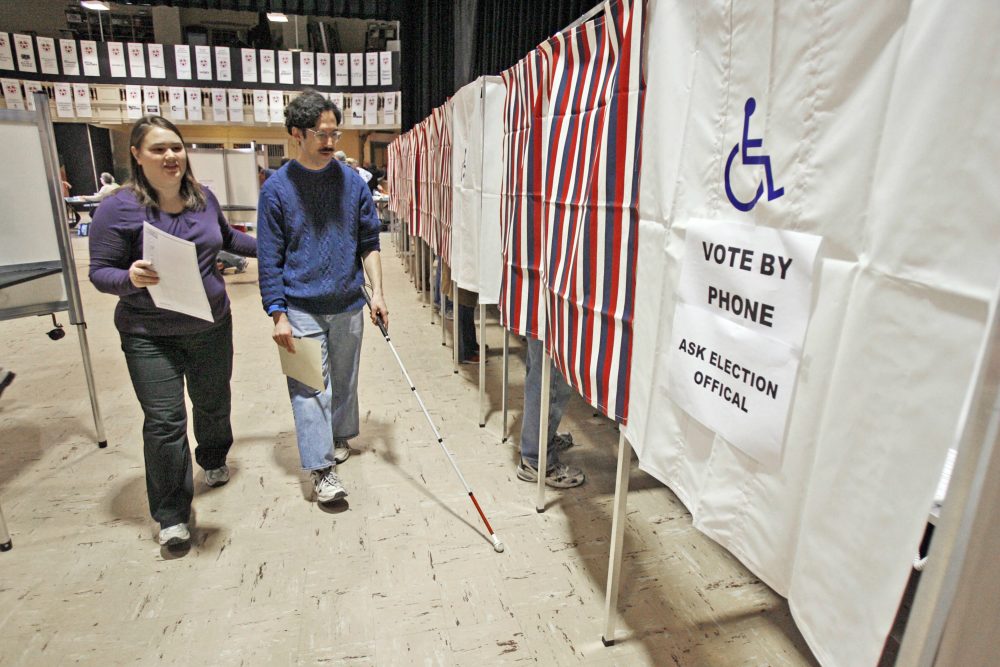Advertisement
I'm Blind And I Voted. Here's What Went Wrong

COMMENTARY
The good news is that voting, as an American tradition, is alive and well. The bad news is that the disenfranchisement of people with disabilities — also a tradition in this country — is, too. I experienced it firsthand last Tuesday in Augusta, Maine, when I attempted to exercise my constitutional right to vote.
I am a disability rights attorney who happens to be blind. Neither blindness nor accessible voting systems are new to me: I have been blind since childhood, and I was a driving force in the implementation of the accessible voting system component of the Help America Vote Act in Maine and New Hampshire.
On Tuesday, when I went to vote, the problems were immediate: It took two people from the city clerk’s office a half hour to get the accessible voting machine working. Once it was ostensibly functioning, it would not accept my selections on the first try — or the second, third or fourth. In fact, not until my fifth attempt. Did nondisabled voters need to wrestle their paper ballots into compliance like this?
On Tuesday, when I went to vote, the problems were immediate: It took two people from the city clerk’s office a half hour to get the accessible voting machine working.
Roughly 35 minutes after I had begun voting, my ballot was complete — or so I thought.
In talking with my wife about the experience, I discovered that I hadn’t voted on a probate judge race because it hadn’t been programmed into the voting machine. We returned to the poll, and I voted on that race by having my wife read that ballot to me. Upon leaving the polls the second time, a pollworker handing out "I voted" stickers at the exit said, “Thank you for voting twice.” In view of this election’s publicity surrounding voter fraud, this statement, even if meant as a joke, was offensive.
Nobody mentioned to me that there remained several more races and ballot questions that had not been included on the accessible voting machine. I didn't find out until it was too late to rectify that I had been denied my chance to weigh in on several important questions facing our community and our state.
Horrified, I emailed Maine's state director of elections who, in turn, forwarded my email to the Attorney General’s office, from whom I received a response that read, in part, “It is very unfortunate that the local election officials did not tell you that the municipal ballot was not recorded on the …accessible voting system.”
Having this situation referred to as being “unfortunate” is infuriating and offensive. A lot of deep suspicion and media attention in this election have been directed at voter fraud, stolen votes and speculation about rigging. When roughly half of my constitutional right to vote is taken from me, it’s merely “unfortunate”?
How many times has this happened to me and other disabled voters in past elections? How many times on Tuesday were Americans with disabilities deprived of their civil rights? Unfortunate, indeed.
How many times on Tuesday were Americans with disabilities deprived of their civil rights?
A subsequent communication from the AG's office assured me our assistant attorney general and our director of elections would "...be discussing this further... to see what can be done to address your concerns going forward." You’ll forgive my cynicism over a response like that from government employees.
This type of response typifies the shameful tradition of how the rights of disabled Americans are treated.
The frustration I feel over this — the frustration I share with millions of Americans with disabilities — is not new. But what never ceases to amaze me is that here we are in 2016, more than a decade after the passage and implementation of the Help America Vote Act, still deprived of a chance to vote like everyone else. The exclusion of citizens from the democratic process is not merely "unfortunate." Nor is it something to be dealt with "going forward."
The voting rights of America's disabled citizens must be dealt with now.
